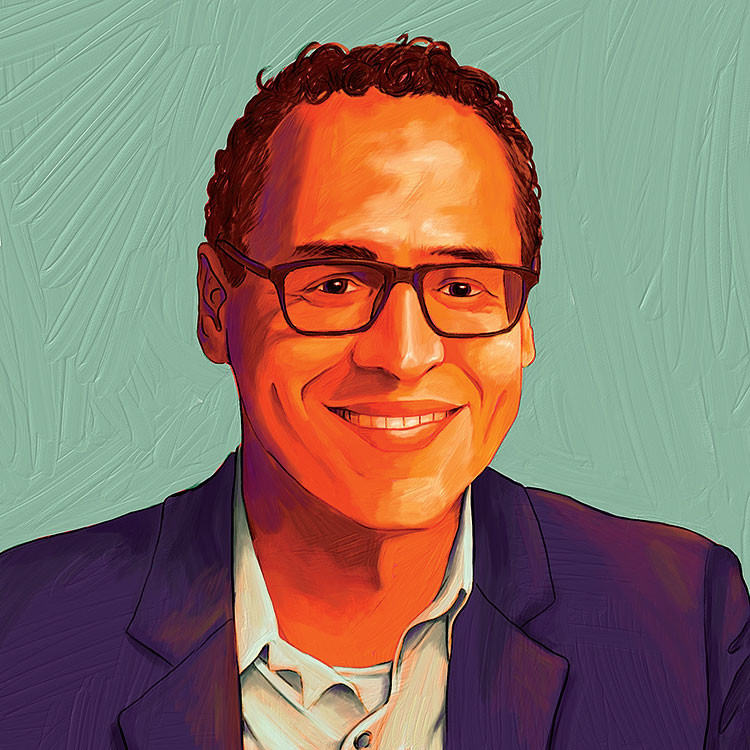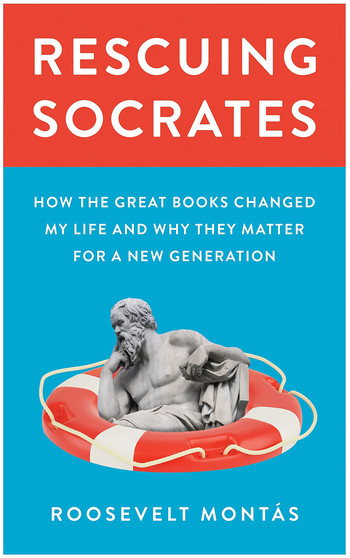In Rescuing Socrates, American-studies professor Roosevelt Montás ’95CC, ’04GSAS makes the case for the kind of liberal education embodied in Columbia’s Core Curriculum.
Lots of people need our help — why rescue Socrates?
The title actually works on three levels. It signals a real moment when I found a volume of Plato’s dialogues in a garbage pile in New York and it changed my life. It alludes to the attempt to free Socrates from jail before he was executed for corrupting the youth of Athens (he refused the help). And it highlights my main topic: revitalizing the centrality of liberal education within the undergraduate curriculum. The book follows these strands, part intellectual memoir, part personal reading of four transformative thinkers — Socrates, Augustine, Freud, and Gandhi — and part polemic.
You say undergraduates often arrive at college “longing for meaning.” Can Socrates rescue them?
His message that “the unexamined life is not worth living” is even more relevant today. Socrates struggled philosophically with the ascendant values of his time — materialism, ambition, and raw political struggle — and proposed a different way of valuing what matters in a human life. Students are often profoundly moved, sometimes even profoundly reoriented, by encountering his uncompromising, full-throttled embrace of the life of the mind.
In some of the most evocative passages in the book, you share your own story. Why?
Describing the ideals of a liberal education and the value of wrestling with texts that have had an outsized impact on the world can sound kind of lofty, unreachable, even sappy. I hoped to make that impact concrete to readers by showing them how it actually played out in my life. At twelve, I moved to New York from a remote village in the Dominican Republic, not knowing English. I attended under-resourced public schools in Queens and then experienced the culture shock of attending Columbia as a first-generation college student. Ultimately, I joined the faculty. Every life is different, but I want people to understand the kind of awakening, empowering, unfolding, and flourishing that this kind of education brought me. Students, and especially those that come from marginalized communities, are often told their education should serve a practical end, that liberal education is an elitist privilege. I argue that it is, in fact, the most powerful tool we have to subvert the hierarchies of social privilege that keep those who are down down.
As director of the Center for the Core Curriculum for ten years, did you have to respond to a lot of people who objected to the very idea of great books?
Yes. A lot of that criticism often focuses on how the great-books tradition has excluded certain groups, including and most especially women, and how it can be used to support and legitimate other forms of exclusion. That’s all real. Acknowledging and dealing with that is part of the learning. Yet these books still matter. We have to be able to disentangle their role in the cultural and institutional evolution of our world from the violations of norms of justice sometimes encoded in them.
It’s not just great books that changed your life but also great teachers.
Yes. Liberal education is something that happens between people, not between books and people or institutions and people. It requires a small, curated artisanal practice in which a student’s individuality is recognized and cultivated for what it is. And so it may produce in you something entirely different than it produces in me. It might make me a brilliant politician; it may make you a recluse and a monk. It takes the individuality of the student as its centerpiece, and that takes another individuality to see it. I had many great teachers.
We live in a particularly fractious time. Can a liberal education help us find common ground?
Absolutely. Reading these books creates a tool of communication and communion across generations, cultures, races, and other lines of diversity. All of our points of difference can come together with a shared vocabulary and meet around shared human questions, bringing in different life experiences and cultural frameworks of interpretation. This discursive connective tissue — a shared way of speaking, debating, and relating — is just extraordinarily valuable, especially in a diverse democracy. It can leave us with a sense of the complexity of the human experience, a sense that there’s always another side to every question and another way of seeing the world.
This article appears in the Spring/Summer 2022 print edition of Columbia Magazine with the title "The Examined Life."




